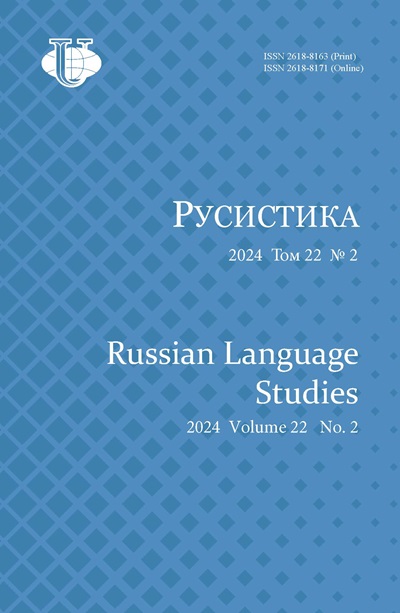Issue
Title
Authors
|
Errachidi I. |
|
Maslova V.A., Danich O.V. |
|
Soltys V.K. |
|
Drozdova O.E. |
|
Dmitriyeva N.M., Prosvirkina I.I. |
|
Filatova E.V. |
|
Gasparian N.K. |
|
Nikitin O.V. |
|
Makarov V.I. |
|
Kudria O.A. |
|
Hmira T. |
|
Shustikova T.V., Žurkina N.V. |
|
Kostromin A.B., Gorbatenko O.G. |
|
Isajeva E.S., Vasiljeva E.G. |
|
Pashkovskaya S.S. |
|
Bartosh J.V. |
|
Rozboudova L., Konecny J., Markova E.M. |
|
Naumenko Y.M. |
|
Gartsov A.D., Asanova C.A. |
|
Kazakova O.P., Rittel N.A. |
|
Sipan V.S. |
|
Makarova V., Terekhova N. |
|
Annushkin V.I. |
|
Burina Е.V. |
|
Kazakbaeva G.A. |
|
Ma Qing -. |
|
Kostromin A.B. |
|
Talibina E.V., Polyakova E.V., Minakova N.A. |
|
Baranova I.I., Chuvaeva K.M. |
|
Vokhmina L.L., Klobukova L.P. |
|
Hamsovszki S.A. |
|
Zhao Z. |
|
Dvoryadkina N.A. |
|
Larina T.V., Ozyumenko V.I. |
|
Arslanova O.R. |
|
Zhelezniakova E.A., Lapteva M.L. |
|
Yelistratov V.S., Ruzhitskiy I.V. |
|
Usmanova Z.A. |
|
Kidyamkina S.A. |
|
Berardi S. |
|
Kulsha D.N., Ryabokoneva O.V. |
|
Kuvychko A.A. |
|
Kurash S.B. |
|
Petrova S.M. |
|
Borzenko E.O., Dobrushina E.R. |
|
Sknarev D.S. |
|
Balykhina T.M., Chernikova T.V., Netesina M.S. |
|
Kuznetsova N.A. |
|
Kytina V.V. |
|
Polyakova (Pashkina) E.S. |
|
Zavarzina G.A. |
|
Minakova N.A., Talybina E.V. |
|
Sveshnikova O.A. |
|
Baryshnikova E.N. |
|
Krotova T.A. |
|
Demeneva K.A. |
|
Penyukovа I.V. |
|
Konstantinova L.A., Pronina E.V. |
|
Kazakova O.P. |
|
Keyko A.S. |
|
Shaklein V.M. |
|
Ratsiburskaya L.V., Zhdanova E.A. |
|
Khavronina S.A., Emrak K. |
|
Zavarzina G.A. |
|
Slozhenikina Y.V., Rastyagaev A.V. |
|
Ndyay M., Nguyen W.T., Grunina E.O. |
|
Bozhenkova N.A., Bozhenkova R.K., Shulgina N.P. |
|
Ivanov E.E. |
|
Shutova M.N., Orekhova I.A. |
|
Nikitin O.V. |
|
Serova L.K., Shabaeva A.V. |
|
Tolstaja A.L. |
|
Ipatova G.N., Serova L.K. |
|
Bykova I.A. |
|
Quach Thi Binh Tho -. |
|
Loginova I.M. |
|
Emelyanova T.V. |
|
Orlova E.V. |
|
Moldakhmetova G.Z. |
|
Denissenko V.N., Rybakov M.A., Shuraeva E.L. |
|
Brygina A.V., Zorina G.S. |
|
Khokhlina M.L. |
|
Loginova I.M. |
|
Sirotkina T.А. |
|
Deryabina S.A., Liubimova N.A. |
|
Mamontov A.S. |
|
Zolotykh L.G., Tsiu S. |
|
Mokienko V.M. |
|
Zakharova L.V., Gunina L.A. |
|
Filyasova Y.A. |
|
Ojuunchuluun B. |
|
Budiltseva M.B., Varlamova I.J. |
|
Orlov E.A. |
|
Novikova M.L., Krapivnaya I.M. |
|
Iljina S.A., Ivanova I.S. |
|
Baryshnikova E.N., Shtyrina E.V. |
|
Deryabina S.A. |
|
Mekeko N.M. |
|
Tsareva N.Y., Budiltseva M.B. |
|
Volotova M.G. |











